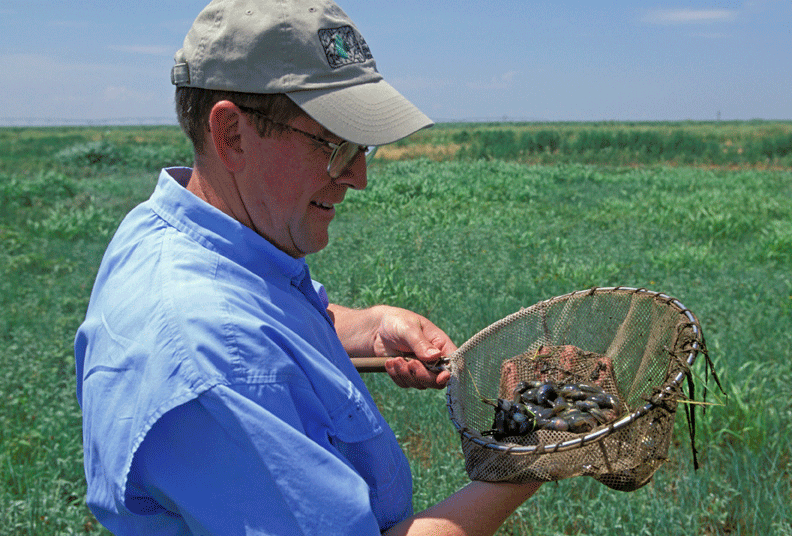Oklahoma State professor honored with national wetlands award
Wednesday, April 6, 2011
Acclaimed wetlands researcher takes a multidisciplinary approach to wetlands conservation.
Story by: Brett Kitchen
Photo by: Doug Wechsler

Dr. Smith is regarded by his peers as the top authority on playa wetlands and one of the world’s leading scholars on wetland ecosystem science. His contributions to the field span 25 years, include several acclaimed books, and more than 170 scholarly articles. Dr. Smith is the Regents Professor and head of the Department of Zoology at Oklahoma State University.
His non-traditional approach to wetland ecology, exemplified by his research program, embraces knowledge from multiple scientific disciplines in tackling wetland research issues. His leadership and expertise on playa wetlands are especially noteworthy, particularly as this resource lacks regulatory protection.
“Loren always sees the big picture with respect to wetland ecology research and management,” said Dr. Scott McMurry, a professor of zoology and colleague of Dr. Smith at Oklahoma State University. “He understands and embraces the need to look at wetlands beyond their borders and across the landscape itself, knowing that what happens beyond the wetland edge is every bit as essential to the function of the wetland as what goes on in the wetland itself.”
Also notable is that all of Dr. Smith’s playa wetlands research is conducted on private land. Relationships cultivated over two decades with local producers and landowners have made possible his successful research endeavors. Dr. Smith has also developed and tested numerous playa wetland management options designed to be compatible with local and regional agricultural operations.
“Perhaps one of the most striking contributions attributable to Loren Smith is his ongoing personal interaction with resource managers and administrators to facilitate active incorporation of current scientific knowledge into the management of wetland resources,” said Dr. Dave Haukos, unit leader of the Kansas Cooperative Fish and Wildlife Research Unit and associate professor of biology at Kansas State University. “As researchers, we all hope that findings from our studies have practical uses and help conserve our natural resources. Loren Smith is one of the few individuals I know who actively pursues that goal, and society as a whole benefits from that effort.”
The quality and availability of water are two of the most important wetland issues for the public. Playas play a direct role in both in the High Plains region. Playas are shallow, seasonal wetlands that lie in the lowest point of a closed watershed. They collect and hold water from rainfall and runoff, and are the primary source of recharge for the Ogallala Aquifer—a 174,000-square-mile groundwater formation that supplies the majority of the water needs in the High Plains. At present, the playas are critically threatened as a result of agricultural and land conversion activities that result in sedimentation.
In 2010, the Society of Wetland Scientist inducted Dr. Smith as a fellow, the organization’s highest honor. His book, Playas of the Great Plains, was named Outstanding Book of the Year in 2004 by the Wildlife Society.
The National Wetlands Awards program is administered by the Environmental Law Institute and supported by the U.S. Environmental Protection Agency, U.S. Fish and Wildlife Service, NOAA National Marine Fisheries Service, USDA Natural Resources Conservation Service, USDA Forest Service, and Federal Highway Administration. A committee of wetland experts representing federal and state agencies, academia, conservation organizations, and the private sector selects the Award recipients.
For more information on the National Wetlands Awards, visit www.nationalwetlandsawards.org or contact Landon Yoder at (202) 939-3829 or e-mail wetlandsawards@eli.org. You may also write to the National Wetlands Awards Program, Environmental Law Institute, 2000 L Street, NW, Suite 620, Washington, DC 20036.
